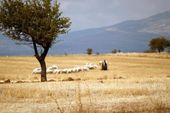
© iStockphotoHerdsman and flock of sheep.
The so-called "silver spoon" effect -- in which wealth is passed down from one generation to another -- is well established in some of the world's most ancient economies, according to an international study coordinated by a UC Davis anthropologist.
The study, to be reported in the Oct. 30 issue of
Science, expands economists' conventional focus on material riches, and looks at various kinds of wealth, such as hunting success, food sharing partners, and kinship networks.
The team found that some kinds of wealth, like material possessions, are much more easily passed on than social networks or foraging abilities. Societies where material wealth is most valued are therefore the most unequal, said Monique Borgerhoff Mulder, the UC Davis anthropology professor who coordinated the study with economist Samuel Bowles of the Santa Fe Institute.
The researchers also showed that levels of inequality are influenced both by the types of wealth important to a society and the governing rules and regulations. Hunter-gatherers rely on their wits, social connections and strength to make a living. In these economies, wealth inheritance is modest because wits and social connections can be transferred only to a certain degree. The level of economic inequality in hunter-gatherer societies is on a par with the most egalitarian modern democratic economies.
The study may offer some insight into the not-too-distant future.
"An interesting implication of this is that the Internet Age will not necessarily assure equality, despite the fact that its knowledge-based capital is quite difficult to restrict and less readily transmitted only from parents to offspring," Borgerhoff Mulder said.
"Whether the greater importance of networks and knowledge, together with the lesser importance of material wealth, will weaken the link between parental and next-generation wealth, and thus provide opportunities for a more egalitarian society, will depend on the institutions and norms prevailing in a society," she said.
For years, studies of economic inequality have been limited by a lack of data on all but contemporary, market-based societies. To broaden the scope of that knowledge, Borgerhoff Mulder, Bowles and 24 other anthropologists, economists and statisticians from more than a dozen institutions analyzed patterns of inherited wealth and economic inequality around the world.
The team included three others from UC Davis -- economics professor Gregory Clark, anthropology professor Richard McElreath and Adrian Bell, a doctoral candidate in the Graduate Group in Ecology.
They focused not on nations, but on types of societies -- hunter gatherers such as those found in Africa and South America; horticulturalists, or small, low-tech slash-and-burn farming communities typical of South America, Africa and Asia; pastoralists, the herders of East Africa and Central Asia; and land-owning farmers and peasants who use ploughs and were studied in India, pre-modern Europe and parts of Africa.
The research is part of the ongoing Persistent Inequality project of the Behavioral Sciences Program based at the Santa Fe Institute. The project has received funding from the institute's Cowan Endowment, the Russell Sage Foundation and the National Science Foundation.

Archaeological proof that the blue-bloods have been frakking us for eons...
Redundant.